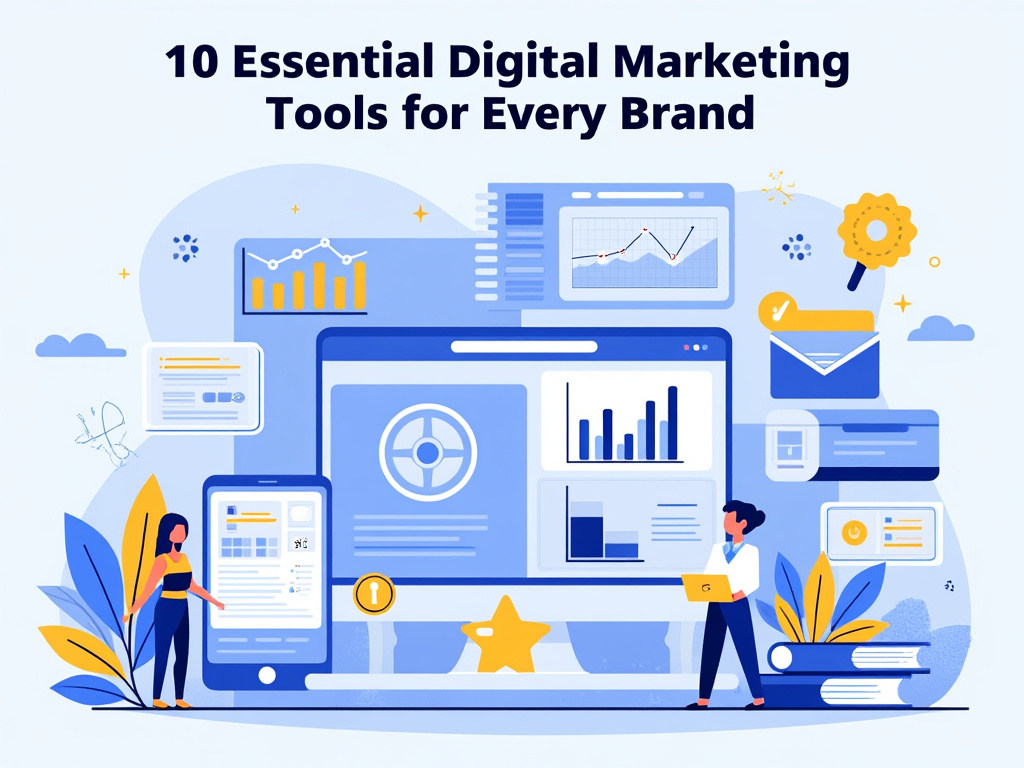10 Essential Digital Marketing Tools Every Brand Needs in 2025

As e-commerce continues to evolve, ensuring your digital marketing strategy is up to date is crucial for standing out in this competitive landscape. With the right tools at your disposal, you can streamline your efforts, enhance customer experiences, and ultimately drive sales. If you’re gearing up for 2025, here’s a rundown of ten essential digital marketing tools every brand should consider incorporating into their strategy.
1. SEO Optimization Tools
Search engine optimization (SEO) is the backbone of e-commerce visibility. Leveraging tools like Moz, Ahrefs, or SEMrush can help you pinpoint relevant keywords, analyze your competition, and track your website’s performance. With these insights, you can craft content that resonates with your audience while climbing those coveted search engine results pages.
2. Email Marketing Automation Platforms
Effective email marketing is about more than just sending out newsletters. With a tool like Incomaker, you can automate your email campaigns to target customers at various stages of their purchasing journey. Whether it’s cart abandonment emails or personalized product recommendations, automating your outreach can lead to higher engagement and conversion rates. Automated workflows save time, allowing you to focus on strategy and creativity.
3. Content Management Systems (CMS)
Whether you’re running a blog or an entire e-commerce site, a robust CMS is essential. WordPress remains a favorite for its flexibility and wide range of themes and plugins. Alternatively, Shopify is a powerhouse for e-commerce, providing user-friendly interfaces and integrated tools for product catalogs, payment processing, and more. Whichever platform you choose, ensure it aligns with your marketing needs.
4. Social Media Management Tools
Social media is indispensable for brand awareness and customer engagement. Tools like Hootsuite or Buffer allow you to schedule posts, respond to customer inquiries, and analyze your performance across various platforms. A cohesive social media strategy not only builds your brand’s presence but also fosters a community around your products.
5. Customer Relationship Management (CRM) Software
Understanding your customers is key to a successful e-commerce strategy. A CRM tool like Salesforce helps track interactions with potential and existing customers, enabling you to tailor your marketing efforts effectively. These platforms allow you to segment your audience, helping you to deliver more personalized experiences.
6. Analytics and Data Tracking Tools
Data is a marketer’s best friend. Google Analytics remains the gold standard for tracking website traffic and user behavior. For e-commerce, consider Google Data Studio for visualizing your data in easy-to-read formats. Understanding how customers interact with your site can inform everything from product placements to marketing campaigns.
7. Conversion Rate Optimization (CRO) Tools
The goal of digital marketing isn’t just to attract traffic; it’s to convert that traffic into sales. Tools like Optimizely or Crazy Egg enable A/B testing, allowing you to experiment with different elements of your website—headlines, buttons, layouts—and identify what resonates best with your audience. Small tweaks can lead to significant improvements in conversion rates.
8. Graphic Design Software
Visual appeal plays a crucial role in e-commerce success. Tools like Canva and Adobe Creative Cloud empower you to create captivating images and graphics for your website and social media. Quality imagery can help convey your brand’s identity and enhance the overall shopping experience.
9. Influencer Marketing Platforms
Influencer marketing continues to dominate in 2024. Platforms like Influencity and AspireIQ connect brands with influencers who align with their values and target audience. Engaging influencers can provide authentic exposure, helping you reach new customers and generate buzz around your products.
10. E-commerce Personalization Tools
Personalization is becoming a game-changer in customer experience. Tools like Incomaker deliver personalized content and product recommendations based on user behavior. By tailoring experiences to individual preferences, you elevate customer satisfaction, fostering loyalty and encouraging repeat purchases.
—
Each of these tools plays a unique role in crafting a successful digital marketing strategy for your e-store. By understanding and integrating them into your workflow, you can navigate the complexities of the e-commerce landscape while effectively engaging with your audience. As 2025 unfolds, equipping your brand with these essentials will set you up for success, maximizing your potential to grow and thrive in an ever-competitive market.



